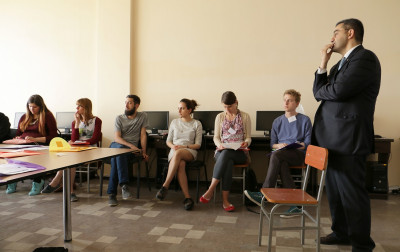Armenian expert about genocide

Presentation about Genocide by Suren Manukyan, the deputy director of the Armenian Genocide Museum-Institute: „You should not reduce it to millions of people who died, but you should see those as one, plus one, plus one...“
First of all, we should ask the question of why to talk about genocide. On the one hand it´s to remember the victims and prevent genocide in the future. On the other hand Suren Manukyan mentioned that in certain circumstances, everyone can turn into a murderer.
Raphael Lemken, a lawyer of Polonized-Jewish, introduced the word "genocide" in the 1940s. Built out of the two parts: genos (Greek) from nation and cide (Latin) from kill. This combination was the essence of the so called Convention of the Prevention and Punishment of the Crime of Genocide (CPPCG) held on 9th December 1948.
From Suren Manukyans' point of view, the two main genocides of the 20th century are the genocide of Armenia and the one in Germany called Holocaust. Similarities of them are the concentration camps, status of second class citizen, deportation and religious backgrounds.
The Armenian genocide was performed in three steps:
1) the disarmament and the murder of Armenian soldiers of the Ottoman army; 2) the incident in April 1915, where several hundred Armenian intellectuals and representatives of national elite were arrested and eliminated; 3) the deportation and the massacres of women, children and elderly people to the desert of Syria.
It´s very important for Armenians to discuss about the genocide. Suren Manukyan is very proud of Armenia leading genocide prevention activities, as:
The Armenians struggle against denials of genocide.
Secondly, Genocide Prevent Resolution Initiatives at the United Nations were found.
At third, the organization of global forums „Against the crime of genocide“ was established.
And last but not least, conferences (for example IAGS conference) and other events (for example the Aurora price) were hosted by Armenians as well.
Annika Sieverding
Joanna Schindler
The article was written during the training course "Get Insight & Get Inside!", supported by the Erasmus+ programme.






